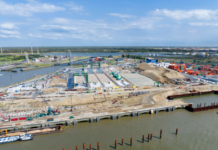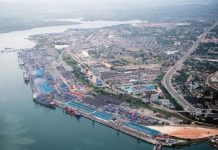
India’s appeals court in Mumbai (Bombay High Court) has rejected the Adani Group’s petition challenging its disqualification from a tender seeking to privatise the state-owned terminal in Nhava Sheva (JNPA), known as the Jawaharlal Nehru Port Container Terminal (JNPCT).
The development is seen as a setback for Adani’s aggressive efforts to further expand its container market share in the country, which have already enabled the private conglomerate to outpace Nhava Sheva as India’s busiest box handler. Mundra Port, about 300 nautical miles away from Nhava Sheva, leads the group’s growth strategy.
“We find no merit in any of the contentions urged on behalf of the petitioner,” the court ruled, turning down Adani’s appeal. “Accordingly, the writ petition stands dismissed.”
The disqualification was triggered by a concession contract termination the group had faced at Visakhapatnam Port.
Other short-listed bidders in the fray for JNPCT include International Container Terminal Services Inc., APM Terminals BV, DP World’s subsidiary Hindustan Ports Pvt. Ltd., Terminal Investment Limited Holding SA, JM Baxi Ports and JSW infrastructure Ltd.
With that favourable court ruling, it is now expected that JNPT will soon announce the winning private bidder for JNPCT, as it has already secured all mandatory government security clearances.
Designed with a linear quay length of 680 metres and an annual capacity of 1.5 million TEU, the JNPCT began operations in 1989.
Nhava Sheva Port currently has 11 container berths across five terminals, of which eight berths are managed by its private concessionaires, such as APM Terminals, DP World, and PSA International, while the other three berths, including a shallow draft facility, are controlled by the landlord port itself.
JNPCT, being a stand-alone terminal beset with infrastructure shortcomings, has struggled to retain or attract container shipping lines operating regular services on long-haul routes. The terminal currently hosts some intra-Asia and coastal or short-sea connectivity calls. As a result, JNPCT ended fiscal year 2021-22 with 440,000 TEU, down 19% from a year earlier, despite overall port throughput growing at a healthy pace.
The terminal privatisation is part of a larger government strategy to monetise stressed public port assets.
PSA International recently began construction work on Phase II development of its Bharat Mumbai Container Terminals (BMCT). The project is expected to go live in April 2025.
Jenny Daniel
India correspondent
Contact email: j.daniel@container-news.com





